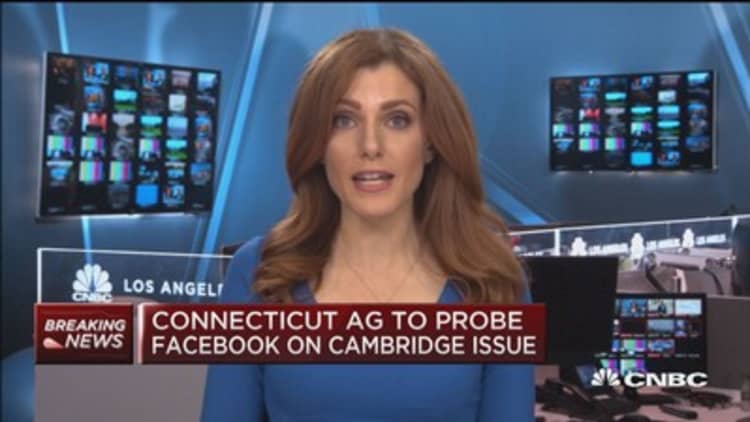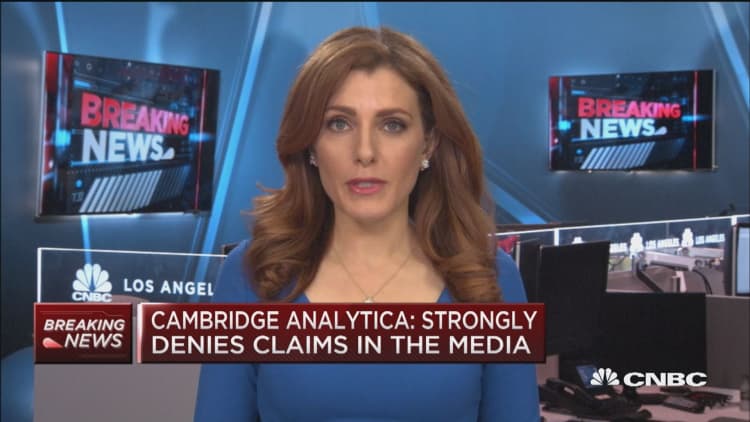
Executives at Cambridge Analytica, a political data firm that worked on digital ads for President Donald Trump's 2016 election campaign, were caught on camera suggesting that the firm could use sex workers, bribes, ex-spies and fake news to help candidates win votes around the world, a new investigation has revealed.
Cambridge Analytica, however, has claimed that the reporters tricked the company, and that it never had any intention of carrying out the scenarios discussed.
The U.K.-based firm is at the center of a data breach scandal involving Facebook.
Britain's Channel 4 News carried out an undercover sting of the company and caught top executives suggesting the tactics.
The news channel's reporter posed as a representative of a wealthy Sri Lankan family looking to gain political standing. While executives initially denied they used "entrapment", after several meetings with the reporter, they put forward some tactics they could use.
One suggestion was to create the scenario of a sex scandal to discredit opponents.
"Send some girls around to the candidate's house, we have lots of history of things," CEO Alexander Nix said. "We could bring some Ukrainians in on holiday with us, you know what I'm saying."
The reporter asked about how the company could help dig dirt on political opponents. Mark Turnbull, the managing director of Cambridge Analytica Political Global, said the company knows ex-spies who used to work for British intelligence agency MI5 and MI6.
Nix suggested that sometimes, the company could go to an incumbent and offer them a deal "that's too good to be true" and then record that and release a video.
"Deep digging is interesting, but you know equally effective can be just to go and speak to the incumbents and to offer them a deal that's too good to be true and make sure that that's video recorded....You know these sort of tactics are very effective, instantly having video evidence of corruption."
One scenario described by Nix is employing someone to come in as a wealthy developer and offer a candidate a large amount of money in exchange for land. The whole exchange would be posted online, Nix said.
The Cambridge Analytica CEO suggested that these are hypothetical scenarios, but did say that some of these tactics had been employed in the past.
"Please don't pay too much attention to what I'm saying, because I'm just giving you examples of what can be done, what has been done," Nix told the undercover reporter.
Cambridge Analytica denied that it used the tactics laid out in the Channel 4 report.
"We entirely refute any allegation that Cambridge Analytica or any of its affiliates use entrapment, bribes or so-called 'honey-traps' for any purpose whatsoever," the company said in a statement.
It also claimed that a Cambridge Analytica executive told the undercover reporters, "We're not in the business of fake news, we're not in the business of lying, making stuff up, and we're not in the business of entrapment… There are companies that do this but to me that crosses a line."
The execs did not meet with the undercover reporters after this session, the company says. Its full statement is below.
Facebook data breach scandal
The Channel 4 News investigation comes after articles published by the New York Times and U.K. newspaper the Observer, showed how the data of millions of Facebook profiles ended up being given to Cambridge Analytica.
Academic Aleksandr Kogan and his company Global Science Research created an app called "thisisyourdigitallife" in 2014. Users were paid to take a psychological test and the app collected the data. It also gathered data on a person's Facebook friends, according to British newspaper The Observer and The New York Times.
In this way, 50 million Facebook profiles were mined for data. Kogan then shared this with Cambridge Analytica, which allowed the firm to build a software solution to help influence choices in elections, according to whistleblower Christopher Wylie, who revealed the alleged practices to both newspapers.

Facebook confirmed Friday that it knew about the app and claimed that Kogan "lied to us" and violated its terms of service in regards to passing data from "thisisyourdigitallife" to a third party.
The social networking site said that around 270,000 people downloaded the app and "gave their consent for Kogan to access information such as the city they set on their profile." Facebook said the data was gathered in a "legitimate way." It also deleted the app in 2015 and said that it received reassurances that all the data was destroyed too.
But Facebook revealed Friday that it had received reports that not all of the data was actually deleted.
"We are moving aggressively to determine the accuracy of these claims. If true, this is another unacceptable violation of trust and the commitments they made," Facebook said in a blog post. Facebook suspended Cambridge Analytica from its platform.
Both Kogan and Cambridge Analytica have denied wrongdoing in regards to the reports in The Observer and The New York Times. The data allegedly held by Cambridge Analytica was not used in the 2016 Trump presidential election campaign.
Full statement
Here is Cambridge Analytica's full statement regarding the Channel 4 report:
Cambridge Analytica rejects the allegations made in tonight's Channel 4 News story regarding its business practices.
The Channel 4 News report contained conversations between Cambridge Analytica senior executives and an undercover reporter posing as a Sri Lankan businessman. The report is edited and scripted to grossly misrepresent the nature of those conversations and how the company conducts its business.
Cambridge Analytica held a series of meetings with the undercover reporter to discuss philanthropic, infrastructure and political projects in Sri Lanka. While outlining the company's services as a data-driven communications and marketing agency, a senior Cambridge Analytica executive clearly set out the principles which govern its work and said the following to the undercover reporter:
"We're not in the business of fake news, we're not in the business of lying, making stuff up, and we're not in the business of entrapment… There are companies that do this but to me that crosses a line."
Despite this clear statement, the undercover reporter later attempted to entrap Cambridge Analytica executives by initiating a conversation about unethical practices. After several meetings discussing ostensibly legitimate projects, the reporter unexpectedly and suddenly turned the conversation towards practices such as corruption and the entrapment of political figures.
Assessing the legality and reputational risks associated with new projects is critical for us, and we routinely undertake conversations with prospective clients to try to tease out any unethical or illegal intentions. The two Cambridge Analytica executives at the meeting humoured these questions and actively encouraged the prospective client to disclose his intentions. They left with grave concerns and did not meet with him again.
We use meetings like this to make an informed decision about those whom we should or shouldn't engage with, in line with the guidance laid out by Section 9 of the UK Bribery Act 2010. The company's practice is for staff to gently de-escalate the conversation before removing themselves from the situation.
However CEO Alexander Nix acknowledges that on this occasion he misjudged the situation:
"In playing along with this line of conversation, and partly to spare our 'client' from embarrassment, we entertained a series of ludicrous hypothetical scenarios. I am aware how this looks, but it is simply not the case. I must emphatically state that Cambridge Analytica does not condone or engage in entrapment, bribes or so-called 'honeytraps', and nor does it use untrue material for any purpose.
"I deeply regret my role in the meeting and I have already apologised to staff. I should have recognised where the prospective client was taking our conversations and ended the relationship sooner."
Cambridge Analytica is a high-profile company. While we work for clients from all sides of the political mainstream across many countries, some do not want it known that they are using a professional political consultancy. We understand this, and allow our clients to work with us discreetly. This is not unusual in the industry.
Like any marketing agency, Cambridge Analytica uses social media platforms for placing paid advertisements and organic content. Influencer marketing and building grassroots networks on social media are both common activities for a modern political campaign.
WATCH: Cambridge Analytica strongly denies media claims



